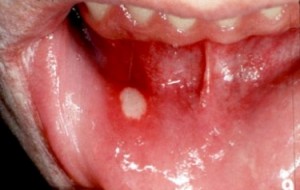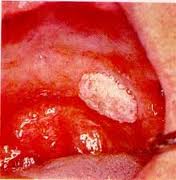Tag: oral cancer
Blog posts, information and advice which mention Oral cancer
Answers to Some Common Questions about Mouth Cancer
Mouth Ulcers – causes, treatment and symptoms
Mouth Ulcers
Mouth ulcers are small painful sores that form in the mouth. The most common type is called aphthous or simple ulcers.
There are three main types of ulcers:
- Minor ulcers are small, non-scarring and usually heal without any treatment within two weeks.
- Major ulcers are 1cm or larger, have a raised border and can last from two weeks to several months. Usually only one or two appear at a time. They can be very painful and cause difficulty eating, are slower to heal and can leave scars.
- Herpetiform ulcers are multiple tiny sores that can be very painful, particularly if they fuse together to form one larger sore. They can last from one week to two months.
Who’s at risk from ulcers?
Most people have at least one attack of mouth ulcers in their lifetime, but mouth ulcers are more common in women and those under the age of 40. Up to one in five people have repeated attacks of mouth ulcers.
More than a third of people with recurrent mouth ulcers have a family history of it. This figure rises to over 80% if both parents get frequent mouth ulcers.
What causes mouth ulcers?
Minor mouth ulcers are usually caused by:
- Damage to the inside lining of your mouth by very hot or acidic food or drink
- Biting your inner cheeks
- Brushing your teeth and gums very hard
- Poorly fitted dentures or orthodontic appliances (braces)
- A very dry mouth due to a medical condition
- Eating food to which you are allergic
- Trauma from food like crusty bread and crisps
- Stress, or lacking vitamins or minerals
- Certain medications
Certain medical conditions can also make mouth ulcers more likely, such as:
- Vitamin B12 deficiency
- Viral infections
- Iron deficiency
- Celiac disease ( intolerance to a protein called gluten )
- Crohn’s disease
- HIV infection
What are the symptoms?
Most mouth ulcers are easy to spot because they are round or oval in shape, whitish in colour and inflamed around the edge.
They are usually seen on the inside of the lips and cheeks, on the floor of the mouth and under the tongue.
Treatment of mouth ulcers
Most mouth ulcers do not need specific treatment and heal naturally without medication. Mouth ulcers usually heal within 7 – 14 days, however treatment can help to numb the pain, protect the ulcer from further damage and decrease the chances of a bacterial infection. Some medicines may also speed up the healing if used early.
In a very small number of cases, ulcers may be a sign of mouth cancer. The recovery rate for mouth cancer is good if spotted early enough, so you should get any persistent mouth ulcers checked out and have regular check-ups with your dentist. We offer a mouth cancer screening service, if you are concerned or interested please do contact us.
Mouth Cancer Awareness Week – Have you Been Checked?
This week (11th-17th November) is Mouth Cancer Awareness Week.
What is mouth cancer?
 Mouth cancer is caused by an abnormal and uncontrolled growth of cells. It is a malignant growth that can occur in any part of the mouth. The Two most common symptoms of mouth cancer are:
Mouth cancer is caused by an abnormal and uncontrolled growth of cells. It is a malignant growth that can occur in any part of the mouth. The Two most common symptoms of mouth cancer are:
• an ulcer in your mouth or on your lip that won’t heal
• constant discomfort or pain in your mouth
Other symptoms can include:
• red or white patches in your mouth
• a lump on your lip, tongue or in your neck
• bad breath
• unexplained bleeding in your mouth
• numbness in your mouth
• loose teeth
• problems chewing or swallowing, difficulty moving your jaw or a feeling that something is caught in your throat
• changes to your voice – it may sound husky or quieter or you may slur your words
• weight loss because of problems swallowing
The BBC have more information about identifying oral cancer on their website.
Who is most at risk?
Nearly 6,236 people are diagnosed with mouth cancer every year in the UK. Just under half (44 per cent) of all mouth cancer cases were diagnosed in people aged 65 and over, with more than a quarter (25 per cent) diagnosed in the under 55s. Although the gap has significantly diminished over time, men are still twice more likely to develop mouth cancer than women.
Risk Factors
Smoking – Still considered to be the leading cause of mouth cancer in the UK, tobacco use transforms saliva into a deadly cocktail that damages cells in the mouth and can turn them cancerous. Advice on giving up smoking is here.
Chewing tobacco – Smokeless tobacco such as betel quid, gutkha and paan, is normally defined as any tobacco product that is placed in the mouth or nose and not burned. Smokeless tobacco is used particularly by south Asian communities. Other parts of Asian communities are also more at risk from the effects of smokeless tobacco including people of Bangladeshi origin.
High alcohol consumption– People who smoke and drink to excess are up to 30 times more likely to develop mouth cancer, as alcohol aids the absorption of tobacco into the mouth. Drinking to excess can increase the risk of developing mouth cancer by four times.
Have a weakened immune system – People who have HIV/AIDS, or who are taking medicines that suppress the immune system, are more likely to develop mouth cancer.
Poor diet – It is recommended that people eat a healthy, balanced diet that includes many vitamins and minerals.


The earlier mouth cancer is diagnosed, the better the chances of recovery. Your dentist may spot mouth cancer in its early stages during a routine examination, so it’s important to visit your dentist regularly.
More information about Oral Cancer is Here. And there’s our own tips on oral cancer prevention on our own website.
Blue Court Dental Care in Harrow always check for early signs of oral cancer. Please book your health check appointment today.

